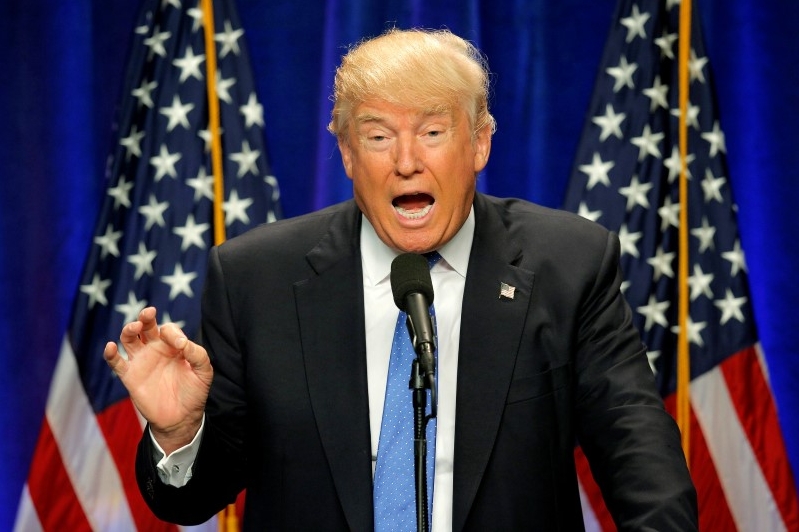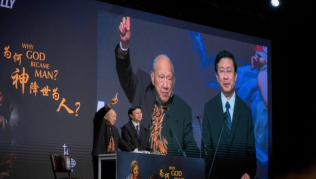
Republican Donald Trump on Monday placed responsibility for a mass shooting in Florida squarely at the feet of radical Muslims, who he said were entering the country amidst a flood of refugees and "trying to take over our children."
The presumptive Republican presidential nominee drew on the country's deadliest mass shooting to sharpen his vow to ban Muslim immigrants, proposing that the United States suspend immigration from areas of the world where there is "a proven history of terrorism."
In his national security speech, Trump said it was time to "tell the truth about radical Islam," the day after 49 people were killed at a gay nightclub in Orlando by a gunman, likely self-radicalized, who had sworn allegiance to the rebel group Islamic State.
His comments contrasted sharply to those of Hillary Clinton, the wealthy businessman's likely Democratic rival in the Nov. 8 election, who urged increased intelligence gathering and more airstrikes on Islamic State territory, and cautioned against "demonizing" American Muslims.
"If we want to protect the quality of life for all Americans - women and children, gay and straight, Jews and Christians and all people - then we need to tell the truth about radical Islam and we need to do it now," Trump told the crowd in New Hampshire.
He went on to lambaste Clinton's policies, saying they would allow "hundreds of thousands of refugees from the Middle East" to enter the United States without adequate security measures.
There would be "no system to vet them, or to prevent the radicalization of... their children," he said. "Not only their children, by the way. They're trying to take over our children and convince them how wonderful ISIS is and how wonderful Islam is, and we don't know what's happening."
Trump said that, if elected, he would use the executive authority of the presidency to impose stronger controls on immigration to protect Americans from attacks, fine-tuning his earlier campaign promise to temporarily ban the entry of foreign Muslims to shore up national security.
"When I'm elected, I will suspend immigration from areas of the world where there is a proven history of terrorism against the United States, Europe or our allies until we fully understand how to end these threats," he said.
He noted that the parents of the Florida gunman, Omar Mateen, 29, were born in Afghanistan. Pointing to specific incidents such as the Sept. 11, 2001, attacks, Trump said threats were posed by people with roots in Pakistan, Saudi Arabia and Somalia.
The immigration ban, he said would last until "we are in a position to properly screen these people coming into our country. They're pouring in, and we don't know what we're doing."
Trump's hard-line proposals on immigration have helped fuel his surge in popularity among some conservative voters. But they have also triggered heavy condemnation from minority and human rights activists, and his political opponents - many of whom have called his rhetoric racist.
Trump has rejected the criticism, and has said he is often misunderstood by the media and his opponents.
'ANTI-WOMAN, ANTI-GAY'
In her response to the Florida massacre, Clinton, warned against demonizing Muslim Americans and called for increased efforts to remove Islamic State propaganda from the internet, more air strikes in areas held by the group and better coordination with allies in the region.
"The Orlando terrorist may be dead, but the virus that poisoned his mind remains very strong, and we must attack it," she said in a speech in Cleveland.
She specifically criticized three U.S. allies - Saudi Arabia, Qatar and Kuwait - for allowing its citizens to fund mosques and schools that train jihadists.
She also proposed stricter gun control laws, reiterating previous calls to prohibit people on terrorism watch lists from buying firearms. She pointed out that while the Federal Bureau of Investigation was aware of Mateen as a possible threat, he was still able to purchase a gun legally.
"It's important that we stop the terrorists from getting the tools they need to carry out the attacks, and that is especially true when it comes to assault weapons like those used in Orlando and San Bernardino," California, Clinton said, drawing a standing ovation from the crowd.
Trump challenged Clinton to explain why she favored letting Syrian civil war refugees into the United States. He said his policies would better protect American women, gays and lesbians, Jews and Christians. Trump's support among women and gay voters lags far behind that of Clinton.
"Radical Islam is anti-woman, anti-gay and anti-American," said Trump.
He accused her of having ties to Saudi Arabia.
"Saudi Arabia and many of the countries that gave vast amounts of money to the Clinton Foundation want women as slaves and to kill gays," he said in a Facebook post. "Hillary must return all money from such countries!"







